Physical Address
304 North Cardinal St.
Dorchester Center, MA 02124
Physical Address
304 North Cardinal St.
Dorchester Center, MA 02124
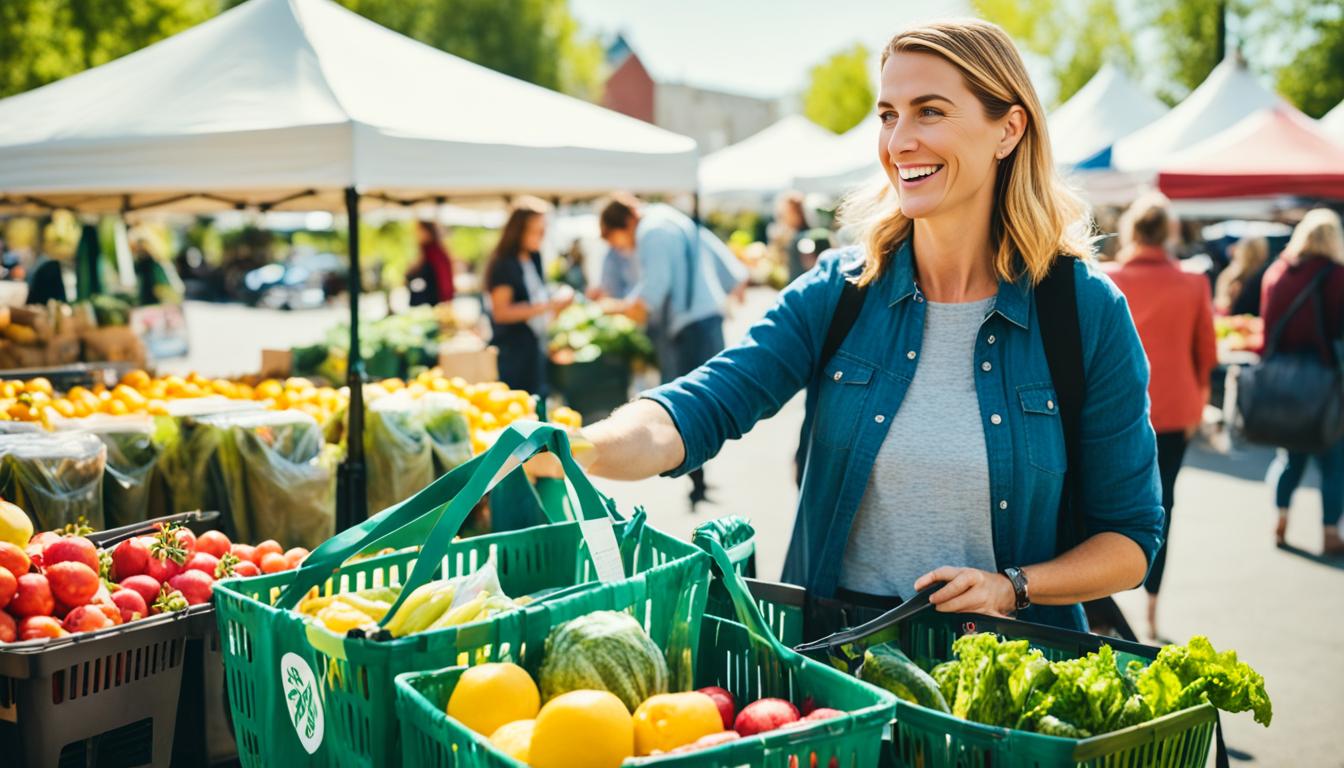
Embrace an eco-friendly lifestyle without breaking the bank with our frugal tips for green living on a budget: smart savings and sustainable choices for eco-conscious consumers.
Right now, I’m thinking about the cost of being green. I see piles of receipts and bills around me. I wonder, is it worth it? Can I look after the planet without spending too much money? It’s a real challenge. But then I realize something amazing – living both green and frugal is possible. Not only that, it can save you serious money in the long run.
We’ll dive into some frugal tips for green living on a budget. We’ll talk about how to make smart choices that are eco-friendly and easy on your wallet. You can start with saving energy and smart shopping. These affordable green habits make you a money-wise earth steward. You’ll learn to live ethically and thrifty, all while caring for the planet.
The average U.S. family pays over $2,200 in home utility bills yearly. By taking steps to reduce home energy use and conserve electricity, you can cut this by 25%. There are many simple ways to save on energy costs.
Remember to turn off lights and unplug electronics not in use. Even in standby, they use electricity. Fully unplugging can save you around £45 a year in Great Britain and £70 in Northern Ireland.
Forty percent of a home’s heating energy can escape through gaps. Weatherization tips like sealing drafts and upgrading windows can save around £80 in Great Britain and £100 in Northern Ireland each year.
Buying ENERGY STAR appliances and LED bulbs can cut energy use. LED bulbs are 80-90% more efficient, saving about £40 a year for the average home. They also help cut carbon emissions by up to 40 kilograms annually.
Change your habits by shortening showers to 4 minutes and washing clothes in cold water. This can save £55 in Great Britain and £70 in Northern Ireland yearly on showers, and about £24 in Great Britain and £36 in Northern Ireland each year on laundry.
Single-use items cost more in the long run and create a lot of waste. Yet, most single-use products have reusable versions. By using materials that can be used over and over, we’s reducing waste in a big way.
Reusable grocery bags are a great way to cut down on plastic. The U.S. makes 34.5 million tons of plastic waste each year. Plastics could use up 20% of all oil and 15% of our carbon budget by 2050. Choosing durable bags that you can use many times helps the environment and your wallet.
Beeswax food wraps are a smart swap for plastic wrap. They can cover bowls, wrap food, and save leftovers. By choosing these over plastic, we’s lessening the amount of single-use plastic in landfills. It’s an easy way to make a big difference.
Try bamboo paper towel alternatives for a greener, cheaper option. These towels can be washed and reused, which cuts waste and saves money. Don’t forget, proper recycling boosts the benefits of our eco choices. So, using such products is good for the planet.
Not just bags and wraps, but also reusable cleaning supplies help. Choosing mop pads and sweepers that you can use again is good for the Earth. It also proves to be a better deal for us, economically. They keep our homes clean without a constant stream of single-use items.
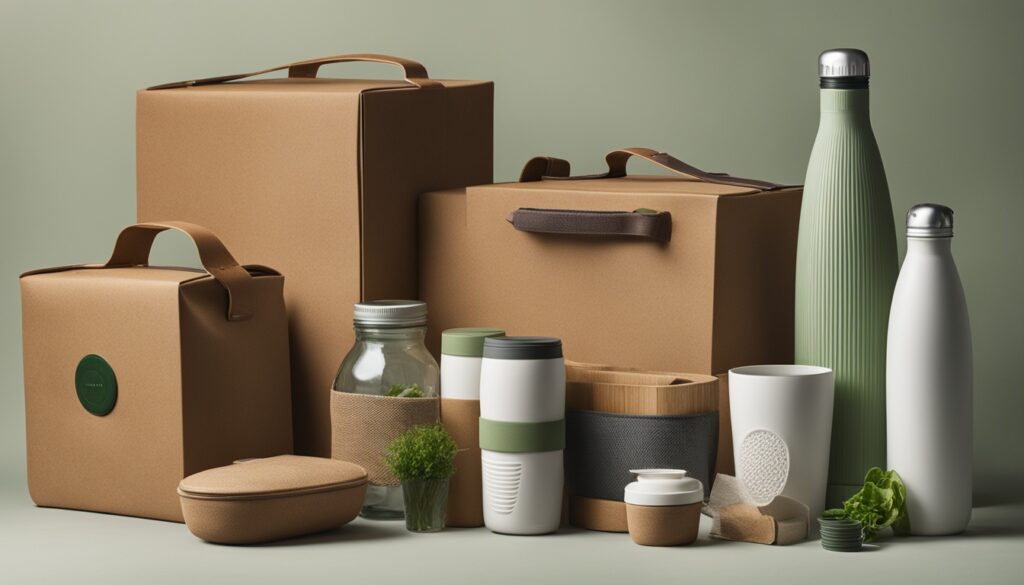
Climate change and other issues are linked to how much meat we eat. The UN says meat and dairy make up almost 14.5% of all greenhouse gases. On the other hand, plant-based diets are much better for the planet, being 10 to 50 times less harmful. Plus, not eating meat can save you about $23 every week. You don’t need to give up meat entirely, but less meat is better for the earth and your budget.
| Product | Climate Impact |
|---|---|
| Beef | High |
| Dairy and Lamb | Moderate |
| Chicken, Eggs, and Pork | Low |
| Plant-Based Proteins (Tofu, Beans, Peas, Nuts) | Lowest |
“Eating Beans Could Be A Magical Solution to Climate Change” – Fast Company
Livestock farming helps some people, but it harms the planet a lot. Going for sustainable meat alternatives and plant-based choices can lower your carbon footprint. It also cuts your grocery costs.
Being green with what you eat doesn’t have to cut out meat totally. Eating less meat can still have a big impact. It’s good for both the earth and your money.
Food waste is a big issue. The average home throws out 43% of its food. This adds up to $1,500 wasted every year. Eating leftovers means you throw away less, saving money. If you can’t eat something soon, freeze it to avoid waste.
Research shows that meal planning cuts food waste by 25%. It highlights the need to plan your meals before shopping. Buying in bulk can save 20-30% on costs. So, go for more when it comes to non-perishable goods to spend less.
Keeping track of what you eat and how you cook can save families $1500 yearly. This shows how being efficient with food makes a big difference in the budget. Plus, storing food right can make it last 50% longer. This is key to avoid food spoilage.
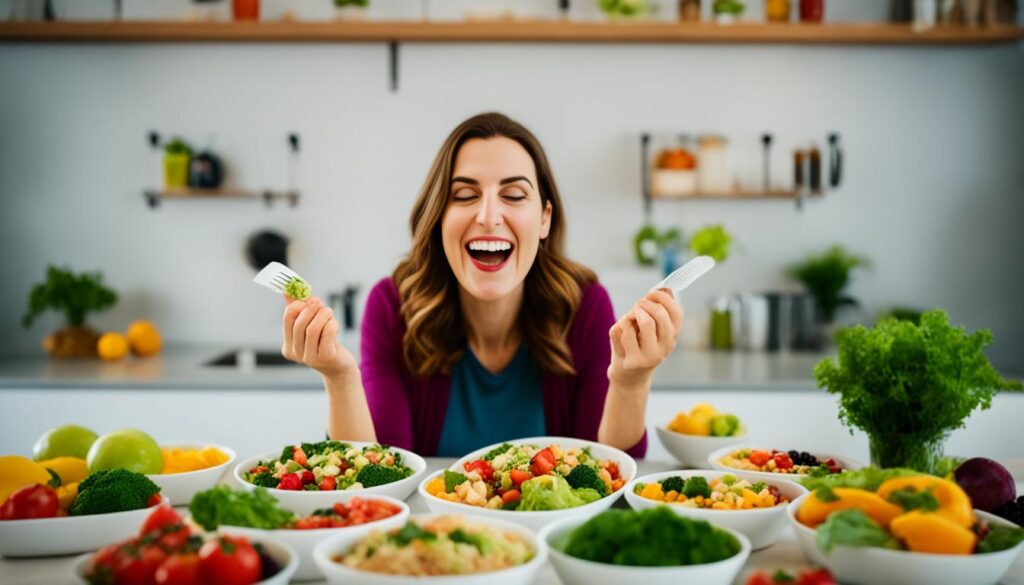
Americans use about 50 billion reusable water bottles every month. That’s around 13 bottles per person. Sadly, these bottles can leak harmful chemicals, like bisphenol A and phthalates, into our water. These chemicals can mess with our bodies, especially our reproductive health. Choosing a reusable water bottle is better for the planet, your health, and your wallet.
The plastic waste issue is getting out of hand, with roughly 310 million tons made each year. Everyone throws out about 83 pounds of plastic yearly. This number is set to go up four times by 2050. By using a reusable water bottle, you can help reduce the huge waste we create.
What’s more, reusable water bottles help you drink better water. They can be filled with filtered, high-quality water. Buying 20 ounces of water from a store can be as expensive as $1.50. Meanwhile, tap water is usually free and safe to drink. By choosing a reusable water bottle, you also save a lot of money in the long run.
Secondhand shopping is great for finding quality items at good prices. It’s part of a circular economy, which reduces waste. This kind of shopping also supports local non-profits and businesses. You can also find quirky, vintage items that are good for the planet. It’s a win-win for your pocket and the earth.
Buying quality items upfront might cost more. But, it’s better in the long run because these items last longer. Secondhand shopping lets you buy these well-made products for less. This saves money and cuts down on waste.
Secondhand shopping means less waste in landfills and helping your local area. Many thrift and secondhand shops support non-profit causes. So, the things you buy can help these good causes.
Finding unique secondhand items is exciting. You can find pieces that show off your style. There are always new things to discover, which encourages you to be bold with your choices.
Living greener doesn’t need to cost a lot. In fact, it can save you money by making strategic changes. One way to do this is by making the things you have last longer.
If something breaks, don’t rush to throw it away. Try DIY fixes first to DIY Repairs and lessen waste. Fixing clothes, swapping out old parts, or updating furniture can make them as good as new.
Shopping in Bulk not only cuts costs but it also cuts down on waste. Buying big sizes of food, toiletries, and cleaning stuff means less packaging thrown away. Plus, it’s fewer trips to the store.
Choosing High-Quality Purchases might cost more at first. But, these items last longer, saving you money and helping the planet. Look for things that are well-made to not have to replace them often.
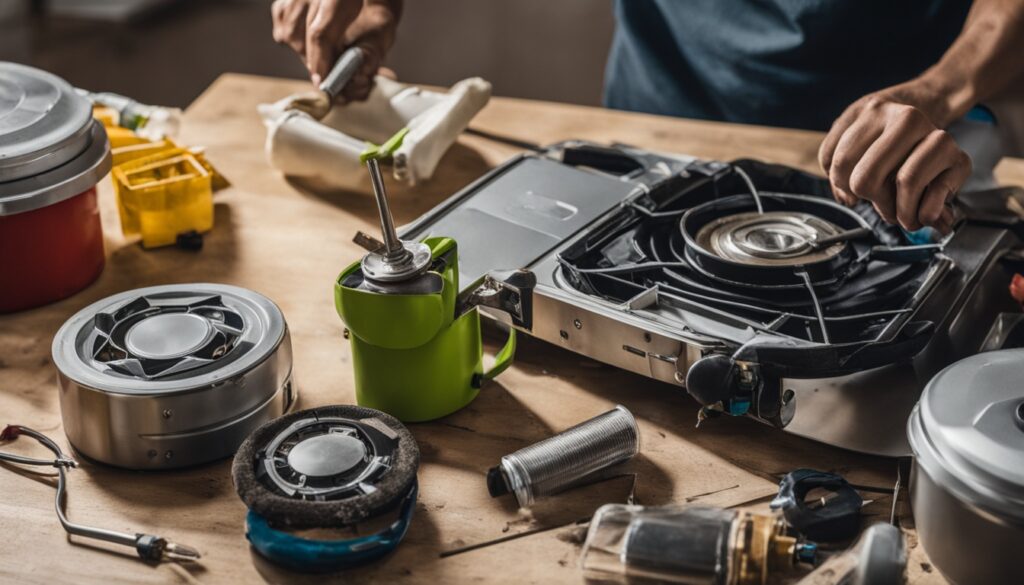
The three Rs are key to cutting down your environmental impact. Reduce Consumption by thinking about what you buy. Focus on what you need, not just what you want. Next time you shop, bring your own bags and bottles. This way, you say no to plastics.
Take reusable bags to the store to avoid using 200 plastic bags every time you shop. This simple act helps you buy less and use things over again. Also, using a solid water bottle instead of buying water in plastic bottles is good for your wallet and for the planet.
Quit single-use plastic bags for food and get some reusable containers instead. It saves money and cuts down on trash. It also helps to Reuse Items and cut back on unnecessary waste.
Don’t throw food waste away. Start composting it. Composting Food Waste is a great way to handle trash. It lessens garbage and creates natural fertilizer for plants.
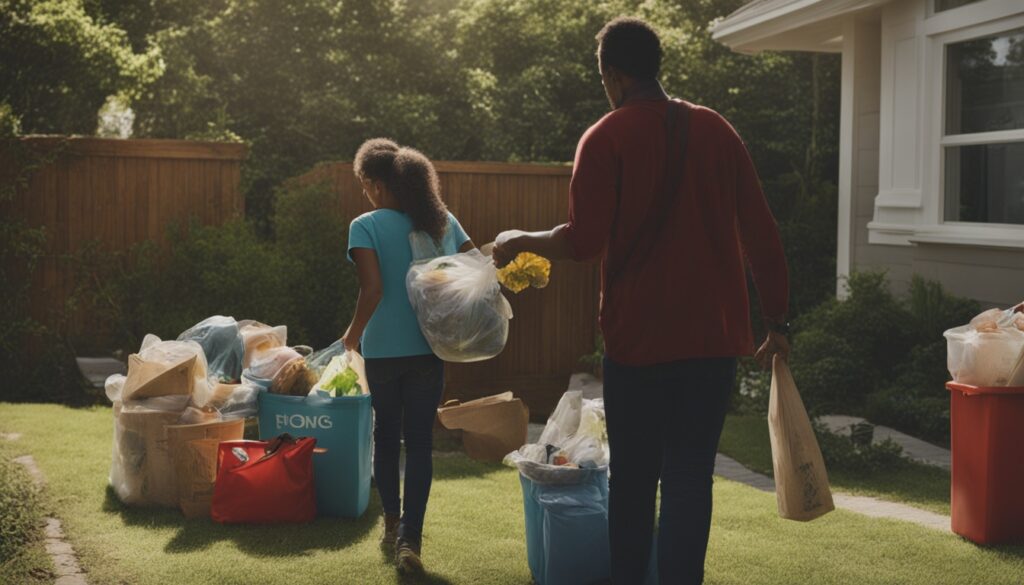
Homemade Homemade Cleaners are better than store chemicals. They are safer, green, save money, and let you choose how strong they are. By making your own Toxin-Free Household Products, you save cash and help the planet. It’s a smart choice.
Vinegar, baking soda, castile soap, and essential oils are great for making Homemade Cleaners. These DIY Green Cleaning options are good for the earth. They don’t have the bad chemicals in store products. You can also pick the power and smell you like.
| Product | Price |
|---|---|
| Supernatural’s Cleaning Kit | $75 (often on sale for $100) |
| Blueland Clean Essentials Kit | $46 ($39 on Amazon) |
| Branch Basics Concentrated Cleaner Kit | $75 |
| Grove Collaborative Essential Cleaner Concentrates | $27 on Amazon, $8 on Grove Co. |
| JAWS Ultimate Cleaning Kit | $50 |
Brands like Supernatural, Blueland, and Branch Basics offer eco cleaner kits. But, making your own Homemade Cleaners is cheaper. All you need is time and a couple of simple items. This way, you get to keep your money and help the environment. It’s a win-win.
Home gardening is great for the planet and your wallet. You can grow your own produce whether you have lots of space or just a little. You can even upcycle food scraps to grow new veggies. This method works for plants like lettuce, celery, and green onions using only a cup of water.
Home gardening has many benefits. You get to decide where your food comes from and its quality. It also helps the environment by reducing the need for transportation. Plus, it lowers your grocery bill by providing fresh ingredients for meals.
Don’t worry if you don’t have a big area for gardening. Container gardens or herb gardens by the window can give you plenty of fresh food. With upcycling food scraps, you cut waste and create your own eco-friendly food at home.
It doesn’t matter if you’re good with plants or just starting out. Growing your own produce is both fulfilling and good for your budget. By choosing home gardening and upcycling food scraps, you cut down on waste. This way, you enjoy tasty meals and help the earth.
Living in an eco-friendly way doesn’t have to break the bank. Many frugal living choices also help the planet. These include using less energy, picking reusables, cutting down on meat, avoiding food waste, and buying used items.
Being both budget-friendly and eco-conscious is easy with a little creativity. Combine sustainable budgeting with eco-aware shopping for a great life. This way, you save money and help the earth.
It’s all about linking money-saving with planet protection. It just takes a bit of effort and a new way of thinking. By adding frugal green moves to your day, you win on cash and the environment.
The average U.S. family spends over ,200 on home utility bills each year. You can save by turning off lights and unplugging electronics. Changing to energy-efficient appliances also helps. By shortening shower times, you’ll use less energy and save money.
One-time use items and their packaging cost more over time. By using items like reusable shopping bags, beeswax wraps, and bamboo towels, you cut down on waste. This saves money compared to always buying new disposable things.
Eating less meat is good for your wallet and the planet. A no-meat diet saves about weekly on food. You can reduce your meat intake to save money and the environment.
The average home throws out
The average U.S. family spends over $2,200 on home utility bills each year. You can save by turning off lights and unplugging electronics. Changing to energy-efficient appliances also helps. By shortening shower times, you’ll use less energy and save money.
One-time use items and their packaging cost more over time. By using items like reusable shopping bags, beeswax wraps, and bamboo towels, you cut down on waste. This saves money compared to always buying new disposable things.
Eating less meat is good for your wallet and the planet. A no-meat diet saves about $23 weekly on food. You can reduce your meat intake to save money and the environment.
The average home throws out $1,500 worth of food annually. Avoid waste by eating leftovers and freezing food. This saves you money.
Americans use 50 billion water bottles monthly. Disposable bottles are harmful to the planet and your pocket. A reusable water bottle saves you money, protects the environment, and is better for your health.
Buying used goods lets you find quality items for less. It also reduces landfill waste and supports local groups. You might even discover unique items to add to your style.
Fix instead of throwing away to save money and reduce waste. Buying in bulk cuts costs and waste. Quality items may cost more upfront but last longer, saving you money long-term.
Bring your own bags and water bottles. Use reusable containers and recycle. These steps help you save money and reduce waste.
Homemade cleaners are safer, cheaper, and better for the earth. DIYing your cleaning products is good for your wallet and the environment.
Growing your own food saves money and lowers your eco-footprint. You can grow food even in small places. You can use food scraps to grow new veggies easily.
,500 worth of food annually. Avoid waste by eating leftovers and freezing food. This saves you money.
Americans use 50 billion water bottles monthly. Disposable bottles are harmful to the planet and your pocket. A reusable water bottle saves you money, protects the environment, and is better for your health.
Buying used goods lets you find quality items for less. It also reduces landfill waste and supports local groups. You might even discover unique items to add to your style.
Fix instead of throwing away to save money and reduce waste. Buying in bulk cuts costs and waste. Quality items may cost more upfront but last longer, saving you money long-term.
Bring your own bags and water bottles. Use reusable containers and recycle. These steps help you save money and reduce waste.
Homemade cleaners are safer, cheaper, and better for the earth. DIYing your cleaning products is good for your wallet and the environment.
Growing your own food saves money and lowers your eco-footprint. You can grow food even in small places. You can use food scraps to grow new veggies easily.